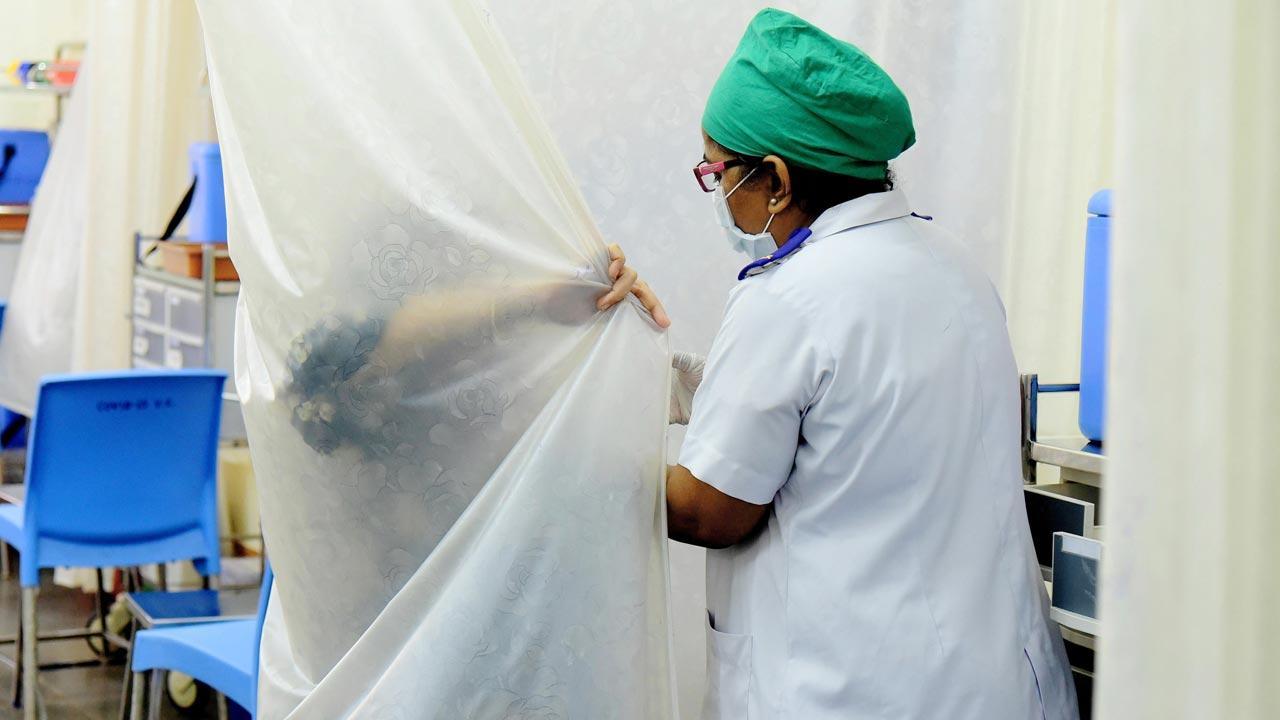Experts say formation of Indian Medical Services in line with IAS and IFS will make India’s healthcare system much more efficient than it is today, say COVID has exposed its shortcomings

The COVID crisis has brought to the fore the weaknesses of our healthcare system. Pic/Suresh Karkera
A parliamentary panel favouring the formation of Indian Medical Services in line with services like IAS, IFS and IRS has left the medical fraternity excited. The COVID crisis and the resultant experiments with drugs had brought into focus the need for the IMS.
mid-day has consistently run reports on the need for IMS in the country. Here are some of them:
. Indian Medical Services needed for administrative decision on healthcare - July 8, 2020
. Indian Medical Services needed to save 'crumbling health care system’ - July 15, 2020
. Committee submits 40 pages report on need of IMS to IMA - July 22, 2020
A five-member National Working Committee of Indian Medical Association formed to give recommendations on a dedicated IMS had submitted a 40-page report to the Association.
The team was headed by Dr Vedprakash Mishra, national head of the Academic Programme (Indian Programme), UNESCO chair in BioEthics (Haifa), worked on the modulation of structure, operation and function of IMS constituted by Dr Rajan Sharma, IMA’s national president. The working group also includes Dr Vinay Agarwal, former national president of IMA; Dr Shivkumar Utture, president of Maharashtra Medical Council and Dr R V Asokan, secretary-general, IMA. Dr S Arulrhaj, president of Association of Physicians of India, and Dr A Marthanda Pillai, ex-national president of IMA, were invitees.
Dr Vedprakash Mishra, Dr Shaikh and Dr Subhash Hira
Dr Vedprakash Mishra, also the author of the report, called the development a matter of immense satisfaction. “It would be a very prudent step which would alter the face and facet of healthcare administrations in coming times ensuring its required streamlining, which would result in actualization of the core constitutional concept of ushering in ‘Welfare State’ with the desired fulfilment of the ‘Right to Health’ as a fundamental right guaranteed within the scope and meaning of Article 21 of the Constitution of India. It gives me great pleasure to have contributed to this larger National cause in a humble way of authoring the said detailed analytical report, which I am happy is turning out to be of great use, utility and relevance for policymaking.”
“The health administration cadre will apart from giving a fillip to an effective healthcare delivery system it will also streamline the entire health management system at all levels including effective meaning and diligent integration thereof. As such the said move will usher in a new era of its type and will entail a huge paradigm shift from the existing parochial health administrative system,” Dr Mishra said.
Dr Wiqar Shaikh, Professor of Medicine, Grant Medical College and Sir J.J. Group of Hospitals, said hopefully the Centre will now consider the recommendations of the Parliamentary Committee and approve the IMS cadre. Being a specialised field, he said a non-medical IAS officer might not be able to efficiently handle medical administration.
Dr Shaikh emphasized that IMS will need to look into the problems of medical colleges in India and correct the deficiencies on a war-footing, with faculty shortage in state-run institutions being the major challenge. He also highlighted the need for super-speciality teaching departments like blood diseases, cancer and rheumatology.
Lack of newer drugs and investigations are again the shortcomings of several medical colleges, he said.
Dr Mishra continued, “The COVID scenario and the limitations of health administration having been revealed beyond any reasonable doubt, the resultant situation also brings out to the fore the need and importance of an administrative health cadre. It would not be prudent to include the same under the rubric of ‘Allied Services’ because it would result in dilution of the entire proposition.”
Dr Subhash Hira, Professor of Global Health at the University of Washington-Seattle, said the emergence of pandemics like AIDS, TB, Malaria, Dengue, NIPAH, Ebola, Swine flu and SARS in the 21st century prompted world leaders to renew their attention on health sector.
“The 21st century was hailed as the ‘Century of Pandemics’ by President Bush in 2005. A good example of a centralised public health service is the United States Public Health Services (USPHS) that manages and oversees all the disease control programs and national health care.”
He said, “mid-day took up the advocacy in 2020 and published several articles. To improve the health sector, it’s time to invest in Medical Education and Research. A lesson learnt from COVID-19 pandemic! Several health sector organisations such as the IMA and PHFI have been recommending IMS cadre for a long time. mid-day’s advocacy has had its national impact on shaping the health policy.”
Though IMS existed during the first and second World Wars, Dr Hira said, it was dismantled soon after Independence. This led to total neglect in the development of the health sector in the country till the end of the 20th century. “That neglect was evident by the lack of political support to the health sector since it was less of a vote-catcher, and budget allocations ranged between O.3 to 1.0 per cent of GDP towards health and medical education.”
1947
Year when IMS had been abolished
‘It would be a very prudent step which would alter the face and facet of healthcare administrations in coming times ensuring its required streamlining, which would result in actualization of the core constitutional concept of ushering in Welfare State with the desired fulfilment of the Right to Health’
Dr Vedprakash Mishra, Chairman of IMA’s National Working Committee
 Subscribe today by clicking the link and stay updated with the latest news!" Click here!
Subscribe today by clicking the link and stay updated with the latest news!" Click here!







